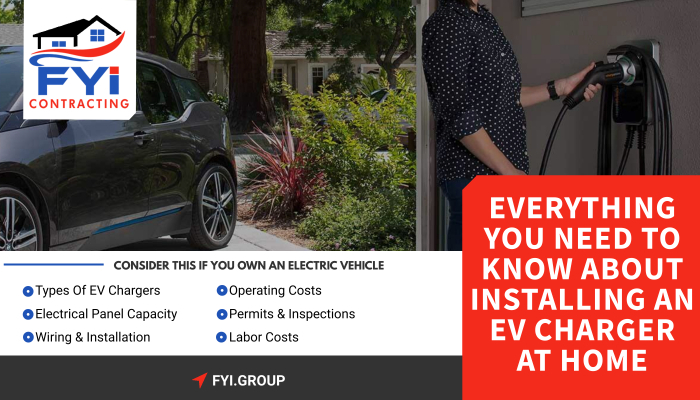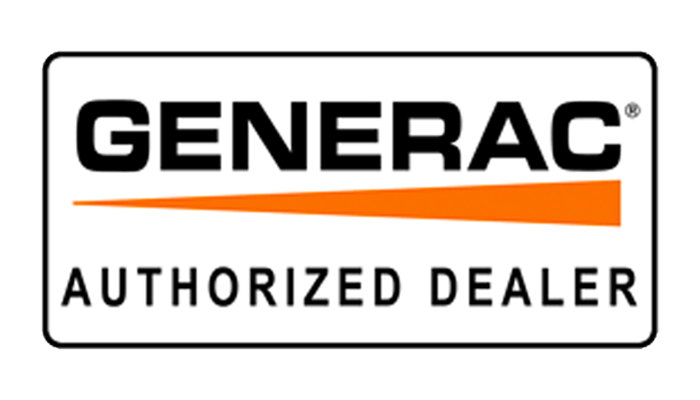In recent years, there has been a significant surge in the popularity of electric vehicles (EVs) as more people embrace sustainable transportation options. With the growing demand for EVs, many homeowners are considering installing EV chargers at home to conveniently power up their vehicles. However, one of the most common questions that arise is: How much does it cost to install an EV charger at home? At FYI Contracting, we understand the importance of providing clear and transparent information to our customers. In this blog post, we’ll delve into the various factors that influence the cost of installing an EV charger at home and provide you with insights to help you make an informed decision.
- Types of EV Chargers: Before diving into the cost, it’s essential to understand the different types of EV chargers available. The three main types include Level 1, Level 2, and Level 3 chargers, with Level 2 being the most common choice for residential installations due to its faster charging speeds compared to Level 1.
- Cost Factors: Several factors can influence the cost of installing an EV charger at home:
- Charger Type: As mentioned earlier, the type of charger you choose will significantly impact the overall cost. Level 2 chargers tend to be more expensive upfront but offer faster charging times, making them a popular choice for homeowners.
- Electrical Panel Capacity: The existing capacity of your electrical panel plays a crucial role in determining the cost of installation. If your panel lacks sufficient capacity to support the EV charger, upgrades may be necessary, adding to the overall cost.
- Wiring and Installation: The complexity of the wiring and installation process can vary depending on factors such as the distance between the electrical panel and the charging location, the need for trenching or conduit installation, and any additional electrical work required.
- Permits and Inspections: Local building codes and regulations may require permits and inspections for EV charger installations, adding to the overall cost.
- Labor Costs: Labor costs associated with hiring a qualified electrician to install the EV charger will also contribute to the total cost. Rates can vary based on the complexity of the installation and local labor market conditions.
- Cost Breakdown: While the cost of installing an EV charger at home can vary widely depending on the factors mentioned above, here’s a general breakdown of potential costs:
- Charger Cost: Level 2 EV chargers typically range from $500 to $1,500 or more, depending on the brand, features, and charging speed.
- Electrical Panel Upgrades: If your electrical panel requires upgrades to support the EV charger, costs can range from $500 to $2,000 or more, depending on the extent of the upgrades needed.
- Wiring and Installation: Wiring and installation costs can vary significantly but may range from $500 to $2,000 or more, depending on factors such as distance, trenching requirements, and additional electrical work.
- Permits and Inspections: Permit fees and inspection costs may vary depending on your location but typically range from $100 to $500 or more.
- Labor Costs: Labor costs for hiring a qualified electrician can range from $500 to $2,000 or more, depending on the complexity of the installation and local labor rates.
- Additional Considerations: In addition to the upfront costs of installing an EV charger at home, there are a few other factors to consider:
- Operating Costs: While EVs generally cost less to operate than traditional gas-powered vehicles, it’s essential to factor in the cost of electricity for charging your vehicle at home.
- Incentives and Rebates: Many governments and utility companies offer incentives and rebates to offset the cost of EV charger installations, making it more affordable for homeowners to make the switch to electric transportation.
Installing an EV charger at home is a significant investment that offers convenience and sustainability benefits for homeowners with electric vehicles. While the cost can vary depending on several factors, including charger type, electrical panel capacity, and installation requirements, the long-term savings and environmental benefits make it a worthwhile investment for many homeowners. At FYI Contracting, we’re here to help you navigate the process and ensure a smooth and efficient installation of your EV charger. Contact us today to learn more about our services and how we can assist you with your EV charger installation needs.
In conclusion, the cost of installing an EV charger at home can vary depending on several factors, including the type of charger, electrical panel capacity, wiring and installation requirements, permits and inspections, and labor costs. By understanding these factors and considering additional considerations such as operating costs and available incentives, homeowners can make an informed decision about installing an EV charger at home. If you’re considering making the switch to electric transportation, contact FYI Contracting today for expert assistance with your EV charger installation needs.










